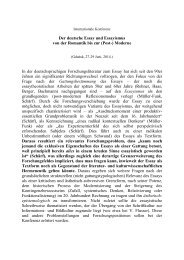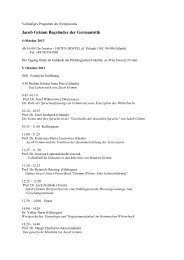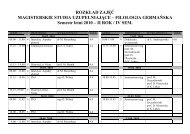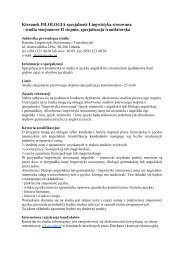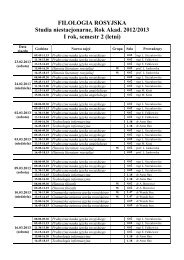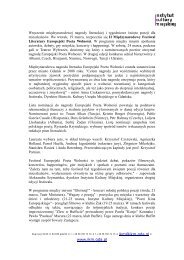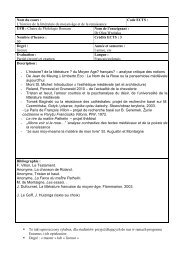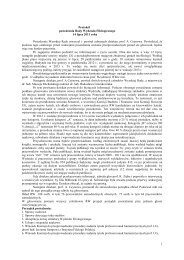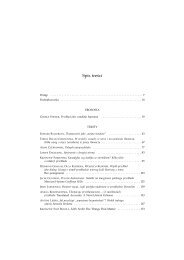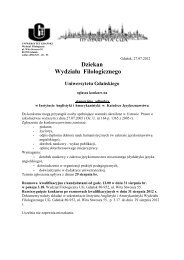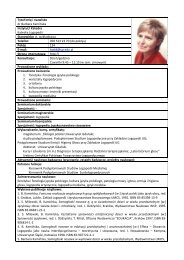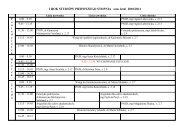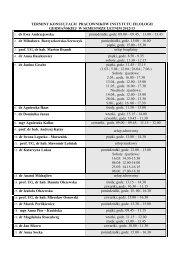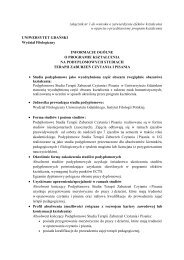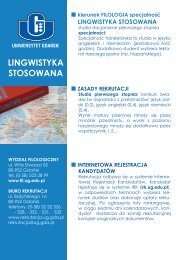Studia I stopnia, filologia angielska, specjalizacja nauczycielska (III ...
Studia I stopnia, filologia angielska, specjalizacja nauczycielska (III ...
Studia I stopnia, filologia angielska, specjalizacja nauczycielska (III ...
Create successful ePaper yourself
Turn your PDF publications into a flip-book with our unique Google optimized e-Paper software.
Seminaria licencjackie: oferta w roku akademickim 2011/2012<br />
<strong>Studia</strong> I <strong>stopnia</strong>, <strong>filologia</strong> <strong>angielska</strong>, <strong>specjalizacja</strong> <strong>nauczycielska</strong> (<strong>III</strong> BA)<br />
dr Mirosława Modrzewska<br />
Program zajęć:<br />
Omówienie przykładowych tekstów z zakresu literatury romantycznej i jej związków z<br />
literaturą wcześniejszych epok: Analizy wybranych dramatów Williama Shakespeara’a<br />
Analizy porównawcze romantycznych dramatów G.G. Byrona i jego związków z dramatami<br />
epoki elżbietańskiej i tzw. Jacobean drama oraz utworami Johna Miltona Omówienie roli<br />
twórczości G.G. Byrona w literaturze polskiej i europejskiej (polski bajronizm od<br />
Mickiewicza po czasy współczesne) Omówienie roli innych romantyków brytyjskich w<br />
literaturze polskiej (przekłady polskie Roberta Burnsa, Walter Scott a powieści Henryka<br />
Sienkiewicza, etc.)<br />
Discussion of literary and dramatic texts selected from the area of British Romanticism<br />
Analysis of Romantic drama and its references to Elizabethan and Jacobean drama<br />
Analyses of chosen dramas by William Shakespeare Comparative analyses of dramatic<br />
texts by G.G. Byron and their relationship to Elizabethan and Jacobean drama, as well as<br />
poetic works by John Milton Discussion on the role of G.G. Byron In English, Polish and<br />
European literature (e.g. The phenomenon of Polish Byronism from the time of A.<br />
Mickiewicz till recent times) Discussion of the role of British Romantics in Polish Culture<br />
(Polish translations of Robert Burns, Walter Scott and the novels by Henryk Sienkiewicz,<br />
etc.)<br />
Literatura:<br />
W. Shakespeare, trzy wybrane dramaty, wybrane teksty z twórczości G.G. Byrona, np.<br />
Manfred, Cain, Heaven and Earth, Sardanapalus., R. Burns, Tam O’Shanter ,W. Scott,<br />
Waverley<br />
Wymagania i forma zaliczenia:<br />
Aktywny udział w dyskusjach zarówno nad pracą pozostałych studentów, jak i własną.<br />
Terminowe pokazanie pracy na każdym etapie jej powstawania. Trzymanie się zasad:<br />
składa się pracę do sprawdzania etapowo, nie w całości na końcu roku; składa się do<br />
sprawdzania wyłącznie wydruk; przy złożeniu każdego kolejnego opracowania danej<br />
części pracy składa się również poprzednią wersję z uwagami prowadzącej. Studenci,<br />
którzy zdecydują się na pisanie pracy licencjackiej z zakresu twórczości George’a
Gordona będą mogli włączyć się do działań International Byron Society i wziąć udział w<br />
dorocznych studenckich konferencjach byronowskich w Messolongi (Grecja) oraz w<br />
Wielkiej Brytanii (Liverpool and Edge HIll University, 23.03.2012.) Essential requirements<br />
for credit include reading all texts recommended in the course of the meetings, attendance<br />
at the seminars and active participation in discussion. Students are expected to take a<br />
lively interest not only in their own chosen subject but in the work of other students at<br />
every stage of its development. By the end of October 2011, students must have chosen<br />
their topic. Till the end of the semester they should all present a short account of it, both in<br />
writing and orally during the seminar meetings. Students who decide to write their thesis<br />
on the literary works of George Gordon Byron will be invited to take part in the activities of<br />
International Byron Society and take part in the students’ Byron conferences at Messolongi<br />
(Greece) and Great Britain (Liverpool and Edge HIll University, 23.03.2012.)
I.<br />
dr Michał Golubiewski<br />
Seminarium licencjackie językoznawczo-kulturoznawcze przeznaczone jest dla osób<br />
zainteresowanych językiem angielskim w kontekście kulturowym, społecznym,<br />
komunikacyjnym i globalnym. Nacisk położony jest na treści praktyczne oraz własne<br />
badania językowe. Rozmowy kwalifikacyjne na początku września. Kontakt:<br />
mgolubiewski@vp.pl. Więcej na stronie www.soclex.fil.ug.edu.pl.<br />
TEMATYKA dotyczy podstawowych odmian języka angielskiego (geograficznych,<br />
społecznych, zawodowych, stylistycznych historycznych) oraz ich opisu, a także projektów<br />
socjolingwistyczno-leksykograficznych realizowanych przez zespół badawczy prof.<br />
Widawskiego, m.in. Slangu studentów Uniwersytetu Gdańskiego oraz Leksyki<br />
angielszczyzny globalnej.<br />
ZAGADNIENIA, z których studenci piszą prace to np. angielszczyzna afroamerykańska,<br />
akcent nowojorski, angielszczyzna iberoamerykańska, slang w kulturze popularnej,<br />
neologizmy w mediach, zapożyczenia leksykalne, kultura hip-hopowa, tabu w języku i<br />
kulturze, język brytyjskich seriali TV, żargon i terminologia specjalistyczna, język a płeć,<br />
mikrostruktura słowników.
Prof. UG dr hab. David Malcolm<br />
Głównym celem seminarium jest przygotowaniem pracy licencjackiej. Obszar tematyczny<br />
seminarium obejmuje literaturę brytyjską, irlandzką i amerykańską (oprócz dramatu) XIX,<br />
XX oraz XI wieku. Tematy z filmoznawstwa lub z elementami literatury porównawczej<br />
zostaną uwzględnione. Studenci spędzą rok akademicki w ustaleniu, badaniu i<br />
zrealizowaniu wybranego tematu.<br />
The main aim of this year-long seminar is to enable students to write an acceptable praca<br />
licencjacka. The range of topics considered is likely to relate to British, Irish and US<br />
literature of the nineteenth, twentieth and twenty-first centuries (excluding drama). Topics<br />
in film studies may also be considered. Topics in comparative literature are welcome.<br />
Students will spend the year developing their topics, researching them, and writing their<br />
dissertations.
<strong>Studia</strong> I <strong>stopnia</strong>, <strong>filologia</strong>, amerykanistyka (<strong>III</strong> BA)<br />
dr Grzegorz Welizarowicz<br />
The seminar is dedicated to developing individual research projects of students working<br />
towards their BA thesis in the American Studies Program.<br />
Areas of interest include American literature, culture, history, society, American politics,<br />
etc. Students will be introduced to the techniques of writing and the rules of citation. A list<br />
of topics will be proposed but individual interests will be encouraged. Keeping a steady<br />
development of the research and writing throughout the whole year is of utmost<br />
importance therefore deadlines for mid-term and the term papers have been set. (See<br />
below) Keeping the deadlines is of utmost importance! Late papers will be deducted two<br />
points per day. Failure to keep a deadline might result in jeopardizing chances for course<br />
completion. Weekly attendance at the seminar and weekly reports on the project's<br />
progress are obligatory. Failure to attend seminars and keep deadlines may result in the<br />
expulsion from the seminar. Students are expected to have completed their dissertations<br />
by June 01, 2012.<br />
GRADES AND EVALUATION<br />
− Long oral project – for each class a different student (or students) will be asked to<br />
prepare a class presentation on a their project. Outlines of the presentation must be<br />
distributed among other students on the day of the presentation.<br />
− Short and longer writing assignments including two mid-term papers and two term<br />
papers.<br />
− MID-TERM WINTER SEMESTER PAPER due NOVEMBER 25, 2012.<br />
− WINTER SEMESTER FINAL PAPER due JANUARY 20, 2012.<br />
− MID-TERM SUMMER SEMESTER PAPER due APRIL 05, 2012.<br />
− SUMMER SEMESTER PAPER due MAY 25, 2012.<br />
ALL PAPERS HAVE TO CONFORM TO THE FOLLOWING STANDARDS:<br />
Font 12, Times New Roman, double spaced, do not justify texts.<br />
writing skills reference book:<br />
MLA Handbook for Writers of Research Papers. 7th edition or later. Modern Language<br />
Association.
dr Arkadiusz Misztal<br />
Celem kursu jest ukierunkowanie oraz pomoc seminarzystom w przygotowaniu prac<br />
licencjackich. Seminarium poświęcone jest zagadnieniom z literatury amerykańskiej<br />
dwudziestego wieku, a zwłaszcza ze współczesnej prozy amerykańskiej. Celem kursu jest<br />
ukierunkowanie oraz pomoc seminarzystom w przygotowaniu prac dyplomowych.<br />
Szczegółowa tematyka zajęć jest uzależniona od wyboru zagadnień, autorów oraz<br />
aspektów ich twórczości, dokonanych przez studentów na początku pierwszego semestru.<br />
W czasie kursu przewidziane są analizy i interpretacje przykładowych tekstów z literatury<br />
amerykańskiej i teorii literatury.<br />
Literatura:<br />
Baym, Nina. ed. Norton Anthology of American Literature. New York: W.W. Norton, 1989.<br />
Con Davis, Robert. ed. Contemporary Literary Criticism. New York: Longman, 1986.<br />
Culler, Jonathan. Literary Theory: A Very Short Introduction. New York: Oxford University<br />
Press, 1997.<br />
Eagleton, Terry. Literary Theory – An Introduction. Minneapolis and London: U of Minnesota<br />
Press, 1983.<br />
Gibaldi, Joseph. MLA Handbook for Writers of Research Papers. 5 th ed. New York: Modern<br />
Language Association of America, 1999.<br />
Hart, James D. The Oxford Companion to American Literature. New York: Oxford University<br />
Press, 1984.<br />
Horton, Rod W., and Herbert W. Edwards. Backgrounds of American Literary Tradition.<br />
New Jersey: Prentice-Hall, Inc., 1952.<br />
Sim, Stuart. ed. The Routledge Critical Dictionary of Postmodern Thought. New York:<br />
Routledge, 1999.
dr Małgorzata Lisiewicz<br />
Touching Infinity. Romantic tradition in the history of art of the United States.<br />
The task of the seminar is to analyze selected artistic phenomena of the 19 th and 20th<br />
century in the United States from the point of their reference to the Romantic tradition. The<br />
students will be invited to define the specificity of the Romantic worldview on American<br />
ground as expressed in painting of the first half of the 19th century, as well as to identify<br />
other aspects of the American past and contemporary visual culture that were possibly<br />
informed by the Romantic mentality/ ideology. The aim of the course is to consider the<br />
importance and vitality of the Romantic tradition in the United States.<br />
Course requirements:<br />
- Participation in classes<br />
- Students are required to attend meetings prepared (some reading material will be<br />
provided, but students will also be requested to search individually for academic<br />
materials).<br />
- Up to two unexcused absences are accepted per semester.<br />
- At least one presentation per semester<br />
- Writing a diploma paper on a specific aspect of the course’s theme (chosen by the<br />
student) including bibliographical resources.
<strong>Studia</strong> I <strong>stopnia</strong>, <strong>filologia</strong> <strong>angielska</strong>, <strong>specjalizacja</strong> translatoryczna (<strong>III</strong> BA)<br />
dr Filip Rudolf<br />
Przekład literacki – współczesna powieść anglojęzyczna XX i XXI wieku<br />
W ramach seminarium studenci piszą pracę dotyczącą przekładu literackiego z<br />
języka angielskiego na język polski lub z języka polskiego na język angielski z szerokiego<br />
zakresu obejmującego przekłady prozy anglosaskiej XX i XXI wieku. Obszar badań<br />
obejmuje:<br />
− literaturę piękną,<br />
− powieść sensacyjną,<br />
− powieści science-fiction i fantasy<br />
− esej literacki<br />
Podczas seminarium studenci zapoznają się z metodologią pisania pracy<br />
licencjackiej, jak również sposobami wykorzystywania źródeł internetowych.<br />
W ramach pisania pracy licencjackiej studenci dokonują wszechstronnej analizy<br />
krytycznej istniejącego już przekładu wybranej powieści anglojęzycznej (brytyjskiej,<br />
amerykańskiej, kanadyjskiej, australijskiej, itp.), porównują istniejące przekłady danego<br />
dzieła, bądź też proponują własną wersję przekładu (który mogą porównać z istniejącym<br />
tłumaczeniem / tłumaczeniami).<br />
Rzecz jasna dopuszczalne są również inne propozycje, choć oczywiście nie<br />
gwarantuję akceptacji wszelkich pomysłów.<br />
Wymagania dotyczące pracy licencjackiej:<br />
Długość: 35 stron.<br />
Bibliografia: 20 pozycji<br />
Styl zapisu: APA citation style:<br />
http://www.liu.edu/cwis/cwp/library/workshop/citapa.htm<br />
Terminy: wybór tematu i tytułu do 10 listopada 2011 r.<br />
Oddanie całości pracy: do 15 kwietnia 2012 roku.<br />
ZALECANE LEKTURY (wybór):<br />
J. Boase-Beier ‘Stylistic Approaches to Translation’<br />
A. Chesterman ‘Memes of Translation’<br />
R. Lewicki ,,Konotacja obcości w przekładzie”<br />
R. Lewicki ,,Obcość w odbiorze przekładu”<br />
R. Leppihalme ‘Culture Bumps’<br />
T. Parks ‘A Literature Approach to Translation – a Translation Approach to Literature’<br />
Lipiński ,,Mity przekładoznawstwa”<br />
O. Wojtasiewicz ,,Wstęp do teorii tłumaczenia”<br />
T. Hermans ‘The Conference of Tongues’<br />
K. Hejwowski ‘Translation: A Cognitive Communicative Approach‘<br />
G. Steiner ‘After Babel’
dr Ross Aldridge
Seminaria magisterskie: oferta w roku akademickim 2011/2012<br />
<strong>Studia</strong> stacjonarne II-go <strong>stopnia</strong>, <strong>filologia</strong>, amerykanistyka (I MA)<br />
Prof. UG dr hab. Andrzej Ceynowa<br />
„Dramat i powieść amerykańska XX wieku”<br />
Na seminarium skoncentrujemy się na amerykańskim dramacie i powieści XX wieku, ze<br />
szczególnym uwzględnieniem ostatnich 50 lat. Zajmiemy się współczesnymi poetykami<br />
dramatu i powieści jak również aktualnie popularnymi podejściami do analizy i interpretacji<br />
utworów. Omawiane będą przede wszystkim te, które budzą wśród seminarzystów<br />
największe zainteresowanie. Seminarium ma przygotować studentów do napisania pracy<br />
magisterskiej. Studenci zapoznają się ze współczesnymi metodami badawczymi,<br />
wykorzystaniem internetowych źródeł informacji naukowej oraz metodologią pisania prac<br />
naukowych. Do końca pierwszego semestru seminarzyści powinni zaproponować temat<br />
swojej pracy magisterskiej i przedstawić wstępną bibliografię do pracy. Zaliczenie<br />
semestru drugiego będzie uzależnione przede wszystkim od <strong>stopnia</strong> zaawansowania<br />
pracy nad magisterką, czyli przedstawieniem rozwiniętej bibliografii, konspektu pracy lub<br />
jej planu i jednego rozdziału.
Prof. UG dr hab. Marek Wilczyński<br />
The seminar will predominantly focus on American fiction and poetry of the 19 th and 20 th<br />
centuries, although in individual cases well-motivated students will be allowed to work on<br />
topics related to drama and/or film. In the first year, each participant will be expected to<br />
give a 45-minute oral presentation of the chosen topic, which will be discussed by the<br />
whole group. Moreover, some first-year seminar meetings will be devoted to discussing<br />
literary and theoretical texts relevant to specific projects. At the end of the first year,<br />
students will be required to submit a detailed outline of the thesis, bibliography, and the<br />
first chapter. The format of the seminar is flexible and open to individual interests of the<br />
participants.
<strong>Studia</strong> stacjonarne II-go <strong>stopnia</strong>, <strong>filologia</strong>,ścieżka literaturoznawcza ( IMA)<br />
Prof. UG dr hab. Joanna Burzyńska<br />
British Novel : from modernity to postmodernity<br />
The seminar course will be devoted to the British Novel . It will primarily focus on the 20th<br />
and 21 st century British fiction though numerous references to the earlier representatives<br />
of the genre will be made as well.<br />
From metodological point of view, the novel will be seen as suspended between the<br />
sociological and philosophical attitudes characteristic of modernity such as empiricism ,<br />
faith that our varied , contingent forms of life and knowledge can be grounded in some<br />
single, ultimate principle and postmodern attitudes rejecting totality, rationality and seeing<br />
all forms of life as relative, made up of mere cultural convention and tradition.Although the<br />
concepts of modernity and postmodernity will constitute the most general point of<br />
reference, much attention will be given to the evolution of the corresponding aesthetic<br />
attitudes including, most notably, modernism and postmodernism. Last but not least, the<br />
novel will be perceived in its varied cultural contexts, not a self-regulating linguistic entity.<br />
General, philosophical and aesthetic considerations will undoubtedly help disambiguate<br />
and profitably describe the individual tratment of the issues like human identity , memory or<br />
attitude to history as well as the modes of textual discourse like narrativity, metaficionality,<br />
intertextuality, used by the British novelists.<br />
Students will also be offered a guidance as to the choice of the theoretical issues<br />
appropriate for the topic and assistance in finding materials for the dissertation.
Prof. dr hab. Jerzy Limon<br />
Seminarium poświęcone będzie teatrowi i dramatowi angielskiego renesansu, w ujęciu<br />
historycznym (literaturoznawczym) i teatrologicznym. Magistranci zapoznają się nie tylko z<br />
tekstami epoki (Szekspir i jego współcześni), ale i z jej tłem kulturowym i politycznym.<br />
Przejdą też podstawowe szkolenie w zakresie nauk pomocniczych, np. paleografii czy<br />
edycji tekstów. Prace teatrologiczne opierać się będą - do wyboru - o realizacje dramatów<br />
Szekspira i jego współczesnych, zarówno filmowych, teatralnych, telewizyjnych, jak i<br />
radiowych. Szczególną wagę przywiązywać się będzie do inscenizacji z ostatnich lat, co w<br />
połączeniu z solidną podstawą teoretyczną, może dać ciekawe wyniki badawcze.<br />
Oczekuje się, że na seminarium zapiszą się osoby interesujące się dramatem, teatrem i<br />
szeroko rozumianą sztuką.
<strong>Studia</strong> stacjonarne II-go <strong>stopnia</strong>, <strong>filologia</strong>,ścieżka językoznawcza ( IMA)<br />
Prof. UG dr hab. Maciej Widawski<br />
SEMINARIUM magisterskie językoznawczo-kulturoznawcze przeznaczone jest dla osób<br />
zainteresowanych językiem angielskim w kontekście kulturowym, społecznym,<br />
komunikacyjnym i globalnym. Nacisk położony jest na treści praktyczne oraz własne<br />
badania językowe. Rozmowy kwalifikacyjne na początku września. Kontakt:<br />
widawski@ug.edu.pl. Więcej na stronie www.soclex.fil.ug.edu.pl.<br />
TEMATYKA dotyczy głównie odmian języka angielskiego (geograficznych, społecznych,<br />
zawodowych, stylistycznych historycznych) oraz ich opisu, a także projektów<br />
socjolingwistyczno-leksykograficznych realizowanych przez zespół badawczy prof.<br />
Widawskiego, m.in. Slangu studentów Uniwersytetu Gdańskiego oraz Leksyki<br />
angielszczyzny globalnej.<br />
ZAGADNIENIA, z których studenci piszą prace to np. angielszczyzna afroamerykańska,<br />
akcent nowojorski, angielszczyzna kanadyjska, slang w kulturze popularnej, neologizmy w<br />
mediach, zapożyczenia leksykalne, kultura hip-hopowa, tabu w języku i kulturze, język<br />
brytyjskich seriali TV, żargon i terminologia specjalistyczna, słowniki dydaktyczne typu<br />
ESL/EFL, mikrostruktura słowników.<br />
PROF. WIDAWSKI to czołowy polski socjolingwista i leksykograf zajmujący się odmianami<br />
angielszczyzny oraz pionier studiów nad slangiem i jego przekładem. Badania prowadził<br />
m.in. na University of Tennessee i Columbia University. Autor 12 książek, w tym The<br />
Polish-English Dictionary of Slang (Hippocrene, New York) i The Dictionary of City Names<br />
in American Slang (Peter Lang, Frankfurt).
Prof. UG dr hab. Danuta Stanulewicz<br />
Warunki uzyskania zaliczenia<br />
Udział w zajęciach.<br />
Przygotowanie referatów (co najmniej 2).<br />
Postęp w pisaniu kolejnych części pracy magisterskiej.<br />
Zakres tematyki<br />
− Językoznawstwo materiałowe, porównawcze, korpusowe; socjolingwistyka; językoznawstwo<br />
stosowane.<br />
− Składnia, semantyka, pragmatyka.<br />
− Preferowane tematy: słownictwo (np. barw), metafory i metonimie, przestrzeń i czas<br />
w języku, język Internetu i innych mediów, akty mowy, Inne tematy także mile widziane.<br />
Program zajęć<br />
1. Przygotowanie pracy magisteskiej: Aspekty merytoryczne i techniczno-formalne<br />
− wybór tematu pracy<br />
− literatura – poszukiwanie, sporządzanie notatek, krytyczne opracowanie<br />
− układ pracy: porządek rozdziałów<br />
− sporządzanie przypisów i odnośników, cytaty<br />
− przygotowanie bibliografii<br />
− język pracy<br />
2. Metody pracy badawczej<br />
a. analiza korpusów<br />
b. analiza tekstów<br />
c. analiza zawartości słowników<br />
d. studium przypadku<br />
e. kwestionariusz<br />
f. eksperyment<br />
g. wywiad<br />
3. Wybrane tematy<br />
referaty z wybranych przez studentów zagadnień<br />
Requirements<br />
1. At least 2 presentations.<br />
2. Attendance.<br />
3. Progress in writing the MA thesis.<br />
Preferred topics<br />
Vocabulary (e.g. colour vocabulary), metaphor and metonymy, the language of the Internet<br />
and other media, time and space in language, speech acts.<br />
Other topics (preferably in a comparative perspective) in syntax, semantics, pragmatics,<br />
sociolinguistics and applied linguistics.<br />
Programme<br />
1. Writing the MA thesis (selecting the topic, bibliography, the structure of the thesis,<br />
footnotes, quotations, language etc.).<br />
2. Research methods (corpus analysis, text analysis, questionnaires, interviews, experiments<br />
etc.).<br />
3. Selected topics: Presentations.
<strong>Studia</strong> stacjonarne II-go <strong>stopnia</strong>, <strong>filologia</strong>,<strong>angielska</strong>, <strong>specjalizacja</strong><br />
translatoryczna (I MA)<br />
dr Justyna Giczela-Pastwa<br />
The seminar will focus on the theory and practice of translating specialised texts,<br />
especially legal and quasi-legal ones. In the first stage, participants will mostly build on and<br />
consolidate their knowledge of selected contemporary translation theories and appropriate<br />
research methodologies. Moreover, discussions during the seminar group meetings will<br />
concentrate on such issues as (the language-specific and culture-specific difficulties in)<br />
achieving equivalence in LSP translation, translating terminology, strategies and<br />
techniques applied in the case of translating LSP texts, using corpora in translation studies<br />
etc. Following the introductory stage, students will prepare research proposals and work<br />
on individual MA projects, preferably devoted to subject matters discussed in the<br />
framework of the seminar.<br />
Essential reading (TBA):<br />
Baker, M. (ed.). 1998/2001. Routledge Encyclopedia of Translation Studies. London, New<br />
York: Routledge.<br />
Hatim, B., Munday, J. 2004. Translation. An Advanced Resource Book. London, New York:<br />
Routledge.<br />
Venuti, L. (ed.). 2004. The Translation Studies Reader. Second Edition. London, New York:<br />
Routledge.<br />
Williams, J., Chesterman, A. 2007. The Map: a Beginner’s Guide to Doing Research in<br />
Translation Studies. Manchester: St. Jerome Publishing.<br />
Alcaraz Varó, E., Hughes, B. 2002. Legal Translation Explained. Manchester: St. Jerome<br />
Publishing.<br />
selected articles from Meta, Babel, Journal of Specialized Translation, Translation Journal,<br />
Target
dr Olga Kubińska<br />
Course name – M.A. Seminar (Postcolonial Translation)<br />
Type – Seminar, obligatory<br />
Level – First year students (continued on the Second year), M.A. programme in English<br />
Philology, translation specialization, advanced<br />
Duration and credit – 60h<br />
Tutor – Olga Kubińska, Ph.D.<br />
Course description: objectives and content –<br />
The aim of the course is to prepare the students to write their M.A. theses in compliance<br />
with all the official regulations and traditional requirements.<br />
During the first two semesters the students are required to do much reading in postcolonial<br />
literatures in English and critical writings on postcolonial texts. Focus is on literary texts<br />
from India, Canada, writings of immigrants in Britain and a selection of English language<br />
prose from Africa. The second domain of extensive reading is theory of postcolonial<br />
culture, combined with the complex problems of translation of postcolonial literatures.<br />
The second semester is also devoted to the pursuit of appropriate topics for future M.A.<br />
theses. The students are required to specify the range of subjects to be covered in their<br />
research. Students either analyze existing translations or prepare their own translations<br />
(circa 50 pages) of chosen texts and analyze translation strategies in accordance with the<br />
methodology of their choice.<br />
There also exists the possibility of cotranslation of postcolonial literature; in such instances<br />
students can additionally explore the phenomena which underlie cotranslation of belles<br />
lettres.<br />
The objectives pursued within the course: ability to select and mine information in chosen<br />
domains, potential for teamwork, multimedia presentations of own work, data search in the<br />
Internet and printed sources, management of databases within such systems as VPN,<br />
Jstor, EBSCO, Scholar Complete, Google Scholar. Proficiency in critical and theoretical<br />
literature, ability to utilize printed holdings of such libraries as BUG (main library of the<br />
University of Gdańsk), Bhum UG (library of the School of Languages at the University of<br />
Gdańsk), Międzyuczelniana Wypożyczalnia (Interlibrary Loan System), etc.<br />
Literature<br />
A/<br />
House, Juliane, Translation, Oxford, OUP 2010<br />
Bassnett, Susan and Harish Trivedi (eds.), Postcolonial Translation. Theory and Practice,<br />
Routledge, London, London and New York 1999<br />
Heaney, Seamus, „O przekładzie Beowulfa”, trans. Olga i Wojciech Kubińscy,<br />
Przekładalne <strong>III</strong>. O wierności, Olga and Wojciech Kubiński (eds.), Gdańsk, Wydawnictwo<br />
Uniwersytetu Gdańskiego 2007, s. 275-293.<br />
Steiner, George, “przekład jako conditio humana”, trans. Olga i Wojciech Kubińscy,<br />
Przekładalne <strong>III</strong>. O wierności, Olga and Wojciech Kubiński (eds.), Gdańsk, Wydawnictwo<br />
Uniwersytetu Gdańskiego 2007, s. 19-39.<br />
Tymoczko, Maria, “Literatura postkolonialna i przekład literacki”, tłum. Agata Sadza,<br />
Współczesne teorie przekładu. Antologia, Piotr Bukowski and Magda Heydel (eds.), Znak,<br />
Kraków: 2009, s.430-447<br />
B/Ashcroft, Bill, Gareth Griffiths and Helen Tifflin (eds.), The Post-Colonial Studies<br />
Reader, Routledge: London 2011<br />
Ashcroft, Bill, Gareth Griffiths and Helen Tifflin, The Empire Writes Back. Theory and<br />
Practice in post-colonial literatures, Routledge, London 2002<br />
McLeod, John, Postcolonial London. Rewriting the metropolis, Routledge, New York 2004
Pym, Anthony, Exploring Translation Theories, Routledge, New York 2010<br />
Suleri, Sara, The Rhetoric of English India, The University of Chicago Press, Chicago 1992<br />
Talib, Ismail, S., The Language of Postcolonil Literatures, Routledge, London 2002<br />
Nazwa kursu – seminarium magisterskie (Przekład Postkolonialny)<br />
Poziom – studenci pierwszego roku studiów II <strong>stopnia</strong> (kontynuacja na drugim roku),<br />
program magisterski na Filologii Angielskiej, <strong>specjalizacja</strong> translatoryczna, poziom<br />
zaawansowany<br />
Długość kursu – 60 godzin<br />
Prowadząca – dr Olga Kubińska<br />
Opis kursu: cele i treści nauczania<br />
Zasadniczym celem kursu jest przygotowanie studentów do napisania prac magisterskich<br />
spełniających wszystkie oficjalne wymogi oraz tradycyjne kryteria.<br />
W trakcie pierwszego i drugiego semestru seminarium zadaniem studentów jest obszerne<br />
oczytanie w dziedzinie badań nad literaturą postkolonialną, połączone z koniecznością<br />
poznania najciekawszych przykładów prozy postkolonialnej obszaru anglojęzycznego (z<br />
naciskiem na literaturę Indii, Kanady, literatury emigrantów mieszkających w Wielkiej<br />
Brytanii oraz przykłądy anglojęzycznych literatur afrykanskich). Drugim obszarem<br />
oczytania jest teoria kultury postkolonialnej, połączona z kwestią przekładu literatur<br />
postkolonialnych.<br />
Drugi semestr przeznaczony jest również na przygotowanie tematu pracy magisterskiej i<br />
określenie jej zakresu: studenci albo analizują istniejące tłumaczenie albo sami<br />
przygotowują przekład (50 stron) wybranego tekstu i analizują strategie translatorskie<br />
zgodnie z przyjętą metodologią. Istnieje możliwość pracy nad współprzekładem literatury<br />
postkolonialnej; w takim wypadku studenci mają dodatkową możliwość badania zjawiska<br />
współprzekładu literatury pięknej.<br />
Cele: umiejętność zdobywania i gromadzenia informacji w opanowywanej dziedzinie,<br />
budowa umiejętności pracy w zespole, prezentacji multimedialnej własnych osiągnięć,<br />
poszukiwanie danych w internecie i materiałach drukowanych,opanowanie baz danych<br />
dostępnych przez system VPN, Jstor, EBSCO, Scholar Complete, Google Scholar.<br />
Znajomość literatury krytycznej i teoretycznej, rozpoznanie zasobów drukowanych<br />
dostępnych w BUG, Bhum UG, Międzyuczelnianą Wypożyczalnię, etc.<br />
Wymagania na zaliczenie: I semestr: zaliczone kolokwium z wyznaczonej bibliografii; II<br />
semestr: przygotowanie konspektu pracy, gotowy przekład własny.<br />
Literatura<br />
House, Juliane, Translation, Oxford, OUP 2010<br />
Bassnett, Susan and Harish Trivedi (eds.), Postcolonial Translation. Theory and Practice,<br />
Routledge, London, London and New York 1999<br />
Heaney, Seamus, „O przekładzie Beowulfa”, przekł. Olga i Wojciech Kubińscy,<br />
Przekładalne <strong>III</strong>. O wierności, pod red. Olgi i Wojciecha Kubińskich, Gdańsk, Wydawnictwo<br />
Uniwersytetu Gdańskiego 2007, s. 275-293.<br />
Steiner, George, “przekład jako conditio humana”, przekł. Olga i Wojciech Kubińscy,<br />
Przekładalne <strong>III</strong>. O wierności, pod red. Olgi i Wojciecha Kubińskich, Gdańsk, Wydawnictwo<br />
Uniwersytetu Gdańskiego 2007, s. 19-39.<br />
Tymoczko, Maria, “Literatura postkolonialna i przekład literacki”, tłum. Agata Sadza,<br />
Współczesne teorie przekładu. Antologia, pod red. Piotr Bukowski i Magda Heydel, Znak,<br />
Kraków: 2009, s.430-447<br />
B/Ashcroft, Bill, Gareth Griffiths and Helen Tifflin (eds.), The Post-Colonial Studies<br />
Reader,
prof. UG dr hab. Wojciech Kubiński<br />
Course name – M.A. Seminar (Audiovisual Translation)<br />
Type – Seminar, obligatory<br />
Level – First year students (continued on the Second year), M.A. programme in English<br />
Philology, translation specialization, advanced<br />
Duration and credit – 60h<br />
Tutor – Professor Wojciech Kubiński<br />
Course description:<br />
objectives and content –<br />
The sole aim of the course is to prepare the students to write their M.A. theses in<br />
compliance with all the official regulations and traditional requirements. The M.A. project<br />
involves translating soundtracks from assorted audiovisual materials (films, TV<br />
productions, etc.). The students must learn how to operate a computer programme for<br />
subtitling. The final work comprises a recorded version of the subtitled material, a transcript<br />
of all the translated dialogues, a theoretical part based on the available literature on audiovisual<br />
translation and an analytical part in which the student discusses problems<br />
connected with the subtitling task. This analysis should particularly focus on those aspects<br />
of the translation project which involve omissions which characterize this mode of<br />
translation, i.e. which elements from the original soundtrack did not find their way to the<br />
subtitles.<br />
Objectives: translation into English of the original soundtrack from a documentary film,<br />
motion picture, TV production, etc., production of a subtitled version of the material,<br />
analysis of the translation options and problems. What is particularly valuable in this<br />
project is that the students would participate in a real translation venture and thereby<br />
would receive “hands-on” translation experience.<br />
Assessment – a formal review of the project produced by two referees and a final oral<br />
examination in front of a panel consisting of the two referees and a chairperson.<br />
Literature<br />
Baker, Mona (ed.). 1998. Routledge Encyclopedia of Translation Studies. London and New<br />
York: Routledge.<br />
Chiaro, Delia, Christine Heiss and Chiara Bucaria (eds.). 2008. Between Text and Image.<br />
Updating research in screen translation. Amsterdam and Philadelphia: John<br />
Benjamins.<br />
Diaz Cintas, Jorge (ed.). The Didactics of Audiovisual Translation. Amsterdam and<br />
Philadelphia: John Benjamins.<br />
Kuhiwczak, Piotr and Karin Littau (eds.). 2007. A Companion to Translation Studies.<br />
Clevedon: Multilingual Matters.<br />
Orero, Pilar (ed.). 2004. Topics in Audiovisual Translation. Amsterdam and Philadelphia:<br />
John Benjamins.<br />
Snell-Hornby, Mary, Zuzanna Jettmarova and Klaus Kaindl (eds.). 1997. Translation as<br />
Intercultural Communication. Amsterdam and Philadelphia: John Benjamins.<br />
Venuti, Lawrence (ed.). 2000/2004. The Translation Studies Reader. London: Routledge.
Nazwa kursu – seminarium magisterskie (Przekład Audiowizualny)<br />
Poziom – studenci pierwszego roku studiów II <strong>stopnia</strong> (kontynuacja na drugim roku),<br />
program magisterski na Filologii Angielskiej, <strong>specjalizacja</strong> translatoryczna, poziom<br />
zaawansowany<br />
Długość kursu – 60 godzin<br />
Prowadzący – Profesor UG, dr hab. Wojciech Kubiński<br />
Opis kursu: cele i treści nauczania<br />
Zasadniczym celem kursu jest przygotowanie studentów do napisania prac magisterskich<br />
spełniających wszystkie oficjalne wymogi oraz tradycyjne kryteria. Projekt pracy obejmuje<br />
autorski przekład ścieżki dźwiękowej pochodzącej z dowolnego materiału audiowizualnego<br />
(film dokumentalny lub fabularny, program telewizyjny, itp.). Dodatkowym celem jest<br />
opanowanie przez studentów komputerowego oprogramowania służącego do<br />
sporządzenia napisów. Ostateczna praca składa się z zapisu opatrzonego napisami<br />
materiału, transkrypcji przełożonych dialogów, części teoretycznej opartej na literaturze<br />
poświęconej przekładowi audiowizualnemu oraz części analitycznej, w której autor pracy<br />
omawia problemy związane z przygotowaniem napisów. Analiza ta powinna szczególnie<br />
koncentrować się na tych aspektach zadania tłumaczeniowego, które wiążą się<br />
koniecznością opuszczenia pewnych fragmentów pierwotnego tekstu, tj. na tych<br />
elementach pierwotnej ścieżki dźwiękowej, które nie znalazły się w ostatecznych napisach.<br />
Cele: przekład oryginalnej ścieżki dźwiękowej dowolnego materiału audiowizualnego,<br />
przygotowanie własnej wersji tego materiału zaopatrzonej profesjonalnymi napisami,<br />
analiza opcji translatorskich oraz problemów tłumaczeniowych. Szczególną zaletą takiego<br />
projektu magisterskiego jest jego praktyczne ukierunkowanie.<br />
Ocena – formalne recenzje projektu napisane przez dwóch niezależnych recenzentów<br />
oraz końcowy egzamin ustny przed komisją złożoną z obu recenzentów i osoby<br />
przewodniczącej.<br />
Literatura<br />
Baker, Mona (red.). 1998. Routledge Encyclopedia of Translation Studies. London and<br />
New York: Routledge.<br />
Chiaro, Delia, Christine Heiss and Chiara Bucaria (red.). 2008. Between Text and Image.<br />
Updating research in screen translation. Amsterdam and Philadelphia: John<br />
Benjamins.<br />
Diaz Cintas, Jorge (red.). The Didactics of Audiovisual Translation. Amsterdam and<br />
Philadelphia: John Benjamins.<br />
Kuhiwczak, Piotr and Karin Littau (red.). 2007. A Companion to Translation Studies.<br />
Clevedon: Multilingual Matters.<br />
Orero, Pilar (red.). 2004. Topics in Audiovisual Translation. Amsterdam and Philadelphia:<br />
John Benjamins.<br />
Snell-Hornby, Mary, Zuzanna Jettmarova and Klaus Kaindl (red.). 1997. Translation as<br />
Intercultural Communication. Amsterdam and Philadelphia: John Benjamins.<br />
Venuti, Lawrence (red.). 2000/2004. The Translation Studies Reader. London: Routledge.
<strong>Studia</strong> niestacjonarne II-go <strong>stopnia</strong>, <strong>filologia</strong> ( IMA)<br />
dr Andrzej Cirocki<br />
MA Seminar: Teaching and Learning a Foreign Language.<br />
The goal of this course is to prepare students for the task of writing an MA dissertation.<br />
Some sessions are aimed at familiarising students with the technical aspects of written<br />
academic discourse. Other sessions are meant to help students to construct a personal<br />
understanding of the interdisciplinary field of SLA. Since this course is mainly designed for<br />
EFL teachers, central areas of foreign language learning/acquisition as well as major<br />
trends in teaching English to primary andsecondary school students will be critically<br />
analysed and constructively discussed. The topics covered in this unit will include: theories<br />
of language learning andteaching, classroom research, materials development, CALL,<br />
testing and assessment,curriculum and syllabus design, language learning strategies,<br />
literature in thelanguage classroom, CLIL and learner autonomy. The final mark will be<br />
based on individual and group reports/projects/presentations,<br />
portfolios of self-designed materials, a dissertation proposal and regular<br />
attendance (80%).
dr Tomasz Wiśniewski<br />
Współczesny dramat brytyjski i irlandzki<br />
Seminarium Współczesny dramat brytyjski i irlandzki skierowane jest do słuchaczy<br />
uzupełniających studiów magisterskich w trybie zaocznym. W centrum zainteresowań jest<br />
tu komunikacja literacka ze szczególnym uwzględnieniem relacji pomiędzy dialogiem,<br />
monologiem a solilokwium. Istotną rolę odgrywa analiza zależności konwencji<br />
dramatycznych od konwencji teatralnych. Uczestnicy seminarium analizują i porównują<br />
grupę wybranych tekstów dramatycznych (trzech – czterech dramatów wybranego autora)<br />
w ujęciu strukturalistycznym i semiotycznym. Cezura czasowa obejmuje końcówkę XIX<br />
wieku po czasy nam współczesne. Głównym celem zajęć jest zapoznanie studentów z<br />
wybranymi kierunkami ewolucji historycznej dramatu współczesnego.
dr Ewelina Gutowska-Kozielska<br />
This seminar is addressed to students interested in discourse analysis (language and<br />
gender, media, politics), communication studies, rhetoric and pragmatics, language and<br />
popular culture, and gender studies.<br />
Requirements:<br />
- 1 st semester :class presentation , short written assignments, presentation of the topic<br />
and a detailed plan of the dissertation<br />
- 2 nd semester -one chapter of the M.A. thesis<br />
Seminarium przeznaczone jest dla student interesujących się analizą dyskursu ( dyskurs<br />
polityki, mediów, jezyk i gender), naukami o komunikowaniu, retoryką i pragmatyką<br />
jezykowa, kulturą popular oraz społeczno-kulturową tożsamością płci.<br />
Wymagania:<br />
- 1szy semestr: prezentacja na zajęciach, przygotowanie krótkich tekstów pisemnych,<br />
określenie tematu i szczegółowego planu pracy magisterskiej<br />
- 2gi semestr - Napisanie pierwszego rozdziału pracy magisterskiej
Prof. UG dr hab. Jean Ward<br />
Zajęcia seminaryjne mają doprowadzić do powstania pracy magisterskiej z zakresu<br />
współczesnej literatury brytyjskiej. Najchętniej zajmę się pracami związanymi z<br />
dwudziestowieczną poezją brytyjską i irlandzką, (np. T. S. Eliota, R. S. Thomasa, Davida<br />
Jonesa, Seamusa Heaneya, Anne Stevenson), poezją religijną oraz przekładem<br />
poetyckim. Jeśli chodzi o prozę, propozycje związane z twórczością G. Greene’a, M.<br />
Spark, E. Waugh’a oraz C. S. Lewisa też będą mile widziane. Inne propozycje mogą być<br />
rozważane pod warunkiem, że wchodzą w zakres moich zainteresowań. Spotkania<br />
seminaryjne będą prowadzone w sposób wymagający od studentów żywe zainteresowanie<br />
nie tylko własną tematyką ale także pracą kolegów.<br />
The field of study in this seminar is contemporary British literature. I will be pleased to<br />
supervise dissertations connected with twentieth-century British and Irish poetry (e.g. T. S.<br />
Eliot, R. S. Thomas, David Jones, Seamus Heaney, Anne Stevenson), religious poetry and<br />
translation of poetry. As regards prose, proposals connected with the work of Graham<br />
Greene, Muriel Spark, Evelyn Waugh and C. S. Lewis will also be welcome. Other<br />
proposals may be considered provided that they enter into the field of my interests and<br />
competence. The seminar meetings will be conducted in a manner that requires<br />
participants to take an active interest in the work of other students as well as their own.
Program<br />
zajęć<br />
Tematyka seminarium:<br />
1 semestr<br />
KLUCZOWE PROBLEMY WE WSPÓŁCZESNYM DYSKURSIE EDUKACYJNYM<br />
Co to jest dyskurs edukacyjny – wprowadzenie.<br />
Dialog, komunikacja, język, władza – związki pomiędzy nimi oraz realia dydaktyczne.<br />
Dyskursywna konstrukcja podmiotu – szanse i zagrożenia dla podmiotowości w polskiej<br />
szkole. Perspektywa krytycznej analizy dyskursu ( CDA)<br />
Emocje i motywacja a dyskurs edukacyjny w glottodydaktyce.<br />
Na drodze od anomii do autonomii – znaczenie dyscypliny, odpowiedzialności i<br />
samosterowności nauczycieli oraz uczniów.<br />
NAUCZYCIEL JĘZYKÓW OBCYCH JAKO ‘INTERCULTURAL TEACHER’<br />
− Sylwetka współczesnego glottodydaktyka – rola, zadania i wyzwania. Definicje<br />
kompetencji.<br />
− Transformacja i zmiana – dwie wytyczne dla filozofii edukacji dzisiaj.<br />
− Nauczyciel języków obcych jako „transformative intellectual” ( za Giroux) oraz jako<br />
„użytkownik wielu dróg” ( za Rutkowiak).<br />
− Transmisja kulturowa wobec zagadnienia autonomizacji ucznia i nauczyciela we<br />
współczesnej szkole.<br />
− Budowanie samoświadomości i samosterowności młodych nauczycieli w kontekście<br />
kultury prefiguratywnej, czyli ile możemy nauczyć się od młodszych?<br />
RETORYKA A SUKCES DYDAKTYCZNY.<br />
II. Kompetencja retoryczna w kształceniu akademickim – wprowadzenie.<br />
<strong>III</strong>. Retoryka a kształcenie lingwistyczne na studiach filologicznych – od świadomości<br />
meta językoznawczej do kompetencji kluczowych.<br />
IV. Inerkulturowość w języku – przejawy, obszary i związek z retoryką.<br />
V. Świadomość retoryczna nauczycieli języków obcych wobec edukacji uczniów ze<br />
specyficznymi trudnościami w uczeniu się.<br />
VI. Interdyscyplinarność glottodydaktyki – pozycjonowanie wobec nauk społecznych.<br />
2 semestr<br />
METODOLOGIA PRACY BADAWCZEJ W GLOTTODYDAKTYCE ORAZ<br />
PEDAGOGICE.<br />
Wprowadzenie do metod badawczych w naukach humanistycznych<br />
Omówienie technik i narzędzi badawczych.<br />
Konstrukcja pracy magisterskiej, wymagania bibliograficzne.<br />
Praca magisterska jako projekt badawczy<br />
Dyskusja w grupach<br />
6-15 : konsultacje indywidualne.
Literatura<br />
Anisimowicz B. (2000), Alternatywne Nauczanie Języków Obcych w XX wieku. Sugestopedia.<br />
Warszawa: DiG.<br />
Anusiewicz J. (1991), Kulturowa teoria języka. Zarys problematyki. (w): J. Anusiewicz, J.<br />
Bartmiński (red.), Język a kultura. Tom 1 Podstawowe pojęcia i problemy, Wrocław:<br />
Wyd. Wiedza o kulturze. s. 17-30.<br />
Bandura E. (2007), Nauczyciel jako mediator kulturowy. Kraków: Wyd. Tertium.<br />
Bogacki K., Głowacka B., Potocka D. (red.) (2008), Interdisciplinary Perspectives in Foreign<br />
Language Teacher Education, Białystok: Wydawnictwo UwB.<br />
Europejski system opisu kształcenia językowego: uczenie się, nauczanie, ocenianie (2003),<br />
Warszawa, CODN.<br />
Grabias S. (1997), Język w zachowaniach społecznych, Lublin: Wyd. UMCS.<br />
Karpińska-Musiał B. (2005), Intercultural Speaker jako odpowiedź na współczesne wyzwania<br />
globalnego społeczeństwa wiedzy. Analiza procesu nabywania kompetencji międzykulturowej<br />
przez ucznia i nauczyciela języków obcych, (w:) J. Krieger-Knieja, U.<br />
Paprocka-Piotrowska (red.), Komunikacja językowa w społeczeństwie informacyjnym.<br />
Lublin: Tow. Naukowe KUL, s. 261-272.<br />
———— (2008b), Nauczyciel i jego kompetencja interkulturowa w obliczu globalizacji<br />
języka angielskiego jako obcego, (w:) A. M. Harbig (red.), Nauczanie języków obcych<br />
w szkole wyższej. Białystok: Wydawnictwo Uniwersytetu w Białymstoku, s. 137-149.<br />
———— (2008c), The Place of Intercultural Competence in the Academic Curriculum of<br />
Foreign Language Teacher Education, (w:) K. Bogacki, B. Głowacka, D. Potocka (red.),<br />
Interdisciplinary Perspectives in Foreign Language Teacher Education. Białystok:<br />
Wydawnictwo UwB, s. 191-200.<br />
Komorowska H. (2007), Metodyka Nauczania Języków obcych w Polsce (1957-2007),<br />
Warszawa: CODN.<br />
Kozielecki J. (2001), Psychotgransgresjonizm. Warszawa: ŻAK.<br />
Kurtyka A. (2005), Rozwijanie kompetencji międzykulturowej nauczycieli języków obcych,<br />
(w:) M. Mackiewicz (red.), Dydaktyka języków obcych a kompetencja kulturowa i<br />
komunikacja interkulturowa. Poznań: Wyd. WSB, s. 83-96.<br />
Myczko K. (2005), Kompetencja interkulturowa jako cel kształcenia językowego, (w): M.<br />
Mackiewicz (red.), Dydaktyka języków obcych a kompetencja kulturowa i komunikacja<br />
interkulturowa. Poznań: Wyd. WSB, s.27-36.<br />
Nikitorowicz J. (2005), Kreowanie tożsamości dziecka. Wyzwania edukacji międzykulturowej.<br />
Gdańsk: GWP.<br />
Pfeiffer W. (2001), Nauka języków obcych. Od praktyki do praktyki, Poznań: Wagros.<br />
Phipps A., Guilherme M. (2004), Critical Pedagogy. Political Approaches to Language and<br />
Intercultural Communication, Multilingual Matters Ltd.<br />
Piaget J. (2005), Mowa i myślenie dziecka. Warszawa: PWN.<br />
Speck O. (2005), Być nauczycielem, Gdańsk: Gdańskie Wydawnictwo Psychologiczne.<br />
Thomas J. (1983), Cross-cultural pragmatic failure, (w:) Applied Linguistics 4(2), 91-109.<br />
Wendland M. (2007), Relatywizm komunikacyjny a problem międzykulturowego<br />
porozumienia, (w:) Homo Communicativus, Poznań: Wyd. UAM.<br />
———— (2003b), Pedagogika międzykulturowa. [w:] Z. Kwieciński i B. Śliwerski (red.)
Wymagania i<br />
forma<br />
zaliczenia:<br />
Formula and requirements for a passing grade:<br />
Seminar will consist partially of lectures (teacher’s presentations), and partially of students’<br />
presentations. We shall meet every week for the first semester. Every next meeting will start<br />
with a presentation or discussion performed by individual students on a theoretical issue which<br />
may correlate with the previously discussed topic, but may also be their own concept,<br />
hopefully related to the preliminary idea of a thesis. It will be followed by introduction of a<br />
new topic by the teacher. By the end of November students will have decided about the topic of<br />
their diploma work. By the end of the first semester (January), students should have their<br />
outlines and first chapters ready. The second semester will be devoted to finishing their<br />
writing, and the meetings may sometimes take place “virtually” via e-mail or individually.<br />
Titles and content of diploma papers should relate to the topic areas discussed in the seminar,<br />
but it is after all the students’ choice. Creativity and good ideas are most welcome!<br />
To pass a seminar, students need to attend the meetings (1 unexcused allowed in a semester)<br />
and comply with the time requirements as to the subsequent parts of writing a thesis. Each<br />
student also needs to have one own presentation in the first semester. They must have their MA<br />
dissertations ready by the end of May 2012.<br />
To recapitulate:<br />
Important deadlines: 1) end of November – topic of the thesis chosen; 2) end of January – first<br />
chapter ready, presentation done<br />
Passing grade (1 st semester) – attendance, presentation, 1 st chapter ready<br />
(2 nd semester) – individual meetings, a dissertation finished by the end of May 2012.



